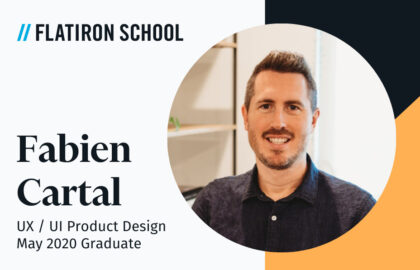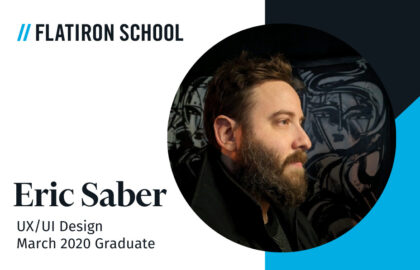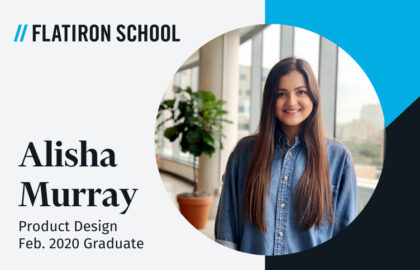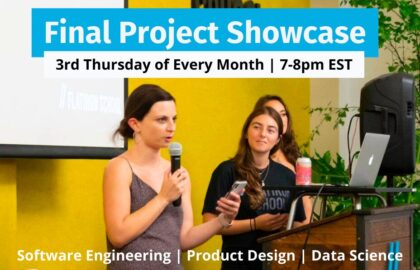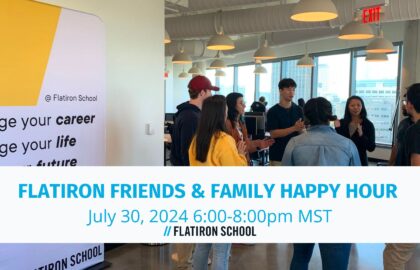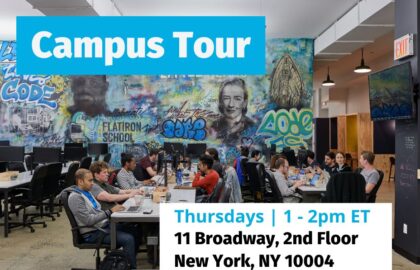The Flatiron School Advantage
You can become a Product Designer.
Our programs take a holistic approach to learning, teaching both the latest technologies and problem-solving techniques. We’ll teach you how to design, but also how to learn and adapt.
Whether you have zero design knowledge, are self-taught, or are somewhere in between, this course will take you from foundational skills to industry-ready.

Possible Career Paths
The demand for Digital Design remains at an all-time high. In fact, The Bureau of Labor & Statistics projects a 16% national growth for Digital Design roles from 2022 to 2031, which is much faster than the average for all occupations. Here are some in-demand jobs you could land:
Product Designer
Average Salary: $138,874*Product Designers are a jack of all trades with a deep understanding of UI and UX. They research business competition and are keen on business goals.
*ZipRecruiter (September 2023)
UX Designer
Average Salary: $115,956*UX Designers focus on the experience of a digital product. They leverage research to understand roadblocks that customers may face.
*ZipRecruiter (September 2023)
UI Designer
Average Salary: $106,351*UI Designers focus on the visual experience of a digital product. This may include fonts, colors, style guides, animations, and responsive design.
*ZipRecruiter (September 2023)
Web Designer
Average Salary: $71,855*Website Designers typically focus on designing in a way that encourages website visitors to take specific actions in order to meet the goals of their website.
*ZipRecruiter (September 2023)
Over $8.6 Million Awarded in Scholarships
We believe that anybody who wants to pursue a career in tech should be able to do so – regardless of how they identify, their background, or financial circumstances.
We offer three different scholarships – Access Scholarship, Merit Scholarship, and Women Take Tech – to support our students in their pursuit of a better life through education.
Learn MoreStudent Success Stories
Not sure if our course is right for you? Hear from students who’ve been where you are. These students took charge of their futures, enrolled in our Software Engineering course, and jumped head-first into a new and exciting career.
Great companies have hired Flatiron School graduates
Upcoming Course Start Dates
| Start Date | Pace | Location | Discipline | Status |
|---|---|---|---|---|
|
August 5, 2024
Aug 5, 2024
|
Part-Time | Online | Product Design | Few Spots Left! |
|
September 2, 2024
Sep 2, 2024
|
Part-Time | Online | Product Design | Open |
|
September 30, 2024
Sep 30, 2024
|
Part-Time | Online | Product Design | Open |
|
October 28, 2024
Oct 28, 2024
|
Part-Time | Online | Product Design | Open |
Start Your New Career Now.
Your Life Won’t Wait For A Career Change
Part-Time
Our part-time course is designed for busy people. If you don’t have 8 hours to dedicate a day, then our part-time course is for you.
- 40 weeks
- Online
- Asynchronous learning at your own pace
- Course highlights:
- Optional live and pre-recorded lessons
- Optional study groups and office hours
- Discord with classmates and instructors
Attend An Event
A Flatiron School event is a great way to get insight into student life, community, and our curriculum.
UX/UI Product Design Curriculum
Our curriculum incorporates the latest emerging technologies, including artificial intelligence (AI) tools. During class, we have a hands-on, community approach to learning, one that includes lab work, creating a real-world portfolio, and 1-on-1 instructor access.
Download The SyllabusAll students are required to complete pre-work before the start of Phase 1 to have a working knowledge of UX and UI processes. During Prep, students prepare for success by familiarizing themselves with the the tools and processes they will utilize during the Product Design course including Figma.
In Phase 1, students will learn about using generative AI as a research analysis tool. Discover how to develop personas and user journeys, conduct market research on competitors, use natural language processing (NLP) to automate the identification and categorization of patterns, and draft surveys for gathering user data. By the end of this phase, students will be able to identify potential opportunities and threats in a product design environment as well as evaluate the long-term effects of AI on design.
In Phase 2, students will learn the essential components of the UI (User Interface) design process, including standard tools, best practices, and deliverables. Learn the fundamentals of interface design as well as how to co-create with AI for inspiration. Explore more about prompt engineering, which can generate design elements such as typography, color palettes, and design patterns based on project requirements. By the end of this phase, students will have hands-on experience and be equipped to harness the full power of AI to fuel the creative process.
In Phase 3, students will learn how to use generative AI to develop content for design projects. Explore how AI can be used to create ideas for content outlines, headings, descriptive copy, microcopy, error messages, FAQ’s, keyword research and SEO. By the end of this phase, students will be able to use AI as a powerful tool to create compelling and effective designs, enabling better communication with users as well as improved user experiences.
In Phase 4, students will learn how to use generative AI to prompt for whiteboard challenges, which will help develop design thinking skills. You will receive evaluations of completed design challenges, which will help you to refine your approach and develop your design skills further. Also, you will have a chance to how to use generative AI to craft compelling narratives to convey the purpose of your work to clients or stakeholders. By the end of this phase, students should develop the ability to think creatively and communicate design ideas effectively.
In Phase 5, students will create and launch an online portfolio of their best work. They will author a case study that explains the insights and decisions they made during the product design process. This program will challenge students to talk competently about their work and to communicate their strengths in UX and UI as they prepare to enter the job market.
Now Offering Product Design Prep Work

Tuition
Whether you are learning from campus or online, full-time or part-time, our programs are the same price.
$16,900As low as $14,900*
We have 3 easy ways to pay:
- Pay up front & in full ($1,000 discount)
- Pay with a traditional loan (as low as $388/month)
- Pay with a payment plan (as low as $642/month)
*Average tuition after scholarships and reflective of financing method, as low as $14,900 upfront or $388 per month
Frequently Asked Questions
Product Design is a holistic concept that has ownership over both UX (user experience) and UI (user interface) design. UX design focuses on the total user experience with a digital product. UI design focuses on the visual experience of a digital product, such as fonts, colors, and animations.
Good UX / UI helps companies achieve their goals. It can help effectively communicate a company’s value, win customer confidence, or even close a sale.
Yes! Product Design is a career with many opportunities and that is relatively future-proof given how many different disciplines it covers – research, analysis, design, experimentation, and more. Flatiron School’s Product Design course prepares students for a variety of career paths, including UX Designer, UX Researcher, UX Writer, Interaction Designer, UI Designer, UI Engineer, Visual Designer, Communication Designer, Information Architect, or Full Stack Designer, just to name a few.
No! While there is a decent amount of drawing involved in UX / UI Product Design, the purpose is to develop or communicate ideas. That can be done very simply – meaning, it doesn’t take a great deal of artistic talent. See this explained firsthand in a Sketching for Design instructional session.
We don’t require you to have prior experience to apply for the Product Design program. Our admissions requirements are being at least 18 years old, having a high school diploma, a GED or equivalent credential, having a native or highly proficient fluency in English, and completing the admissions process.
Before joining your cohort on Day 1, you will have to complete around 40 hours of coursework called Prep to learn the basics of product design so you are prepared to get started straight away.
Before beginning day one at Flatiron School, students will gain access to a pre-work curriculum that covers the course structure, an overview of design tools such as Figma, Invision, and Webflow, and the basics of UX and UI design.
Throughout the course, students will receive hands-on guidance from experienced instructors. We will teach ethical and inclusive design, HTML and CSS, and more. We often bring in guest speakers – past guests have included designers from Oracle, Finstra, and Dataquest (just to name a few). Students will have ample opportunity to participate within Flatiron School’s community events and meet people from other cohorts.
Upon graduation, you’ll receive up to 180 days of one-on-one career coaching, dedicated to helping you find a job in the digital design industry. This includes resume reviews, job search advice and support from experienced coaches, and mock interviews.
The price of our courses reflect our unique approach to learning and support. There are many free resources that can help you learn any discipline, but given the complexity of the topic they can be difficult to navigate independently. Furthermore, students often rave about the camaraderie they establish with instructors, other students, coaches, and alumni – all valuable networking opportunities when it comes to a job search. Our courses and support after graduation are built specifically to provide the structure and community that’s required to be successful.
As for our more traditional competitors – those who are priced similarly and offer live instruction – most haven’t been around as long as Flatiron School, so they may not have the same depth of expertise, employer partner relationships, or alumni network.
The first step is to fill out a written application. Once submitted, you will receive prompts from the admissions team to schedule an interview and take a 15 min aptitude assessment. During the interview a member of the admissions team will learn about your learning needs, career goals, and help you decide whether the program is the right fit for you. If you passed your assessment, we will give you the admissions decision after your interview.
You have a few options in terms of financing your enrollment in one of Flatiron School’s courses. See all of your options on our Tuition & Financing page.
We also offer initiatives that can help to offset the cost of tuition on our Scholarships and Diversity Initiatives page.
The Flatiron School Career Services team exists to help get you hired. You’ll receive guidance on how to:
- Build and Optimize your LinkedIn Profile and Resume
- Ace your behavioral and technical interviews
- Grow your network of tech professionals
- Connect with Flatiron School employer partners
- Negotiate your salary
- Optimize your job search using AI
- Track job search activity using Huntr
You’ll partner with a dedicated Career Coach regularly to make forward progress each week, with up to six months of one-on-one support after graduation.
Our graduates have and continue to make lasting impact in a range of companies from small startups to Fortune 500 companies.
Companies who have hired our grads include:
- Apple
- Microsoft
- IBM
- Shopify
- VOX
- BuzzFeed
- Spotify
- Accenture
- Intel
- Kickstarter
- The New York Times
- Thought Works
- Goldman Sachs
- PWC
- Citi Bank
- Dow Jones
- Akamai
You can view our latest job placement rates in our Jobs Report.
We’ve issued a third-party examined Jobs Report each year since 2014 and remain committed to honesty and transparency with student outcomes.
Feel free to schedule a chat with one of our Admissions representatives. They are here to answer your questions and help you decide the best next steps. Recent students have described their Admissions reps as “easy, supportive, friendly, transparent, and personal.”
